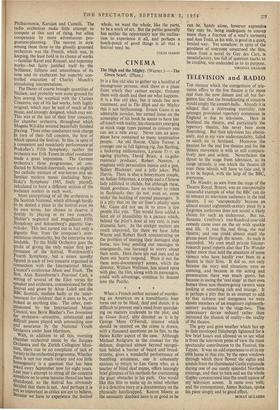TELEVISION and RADIO
THE menace which the competition of tele- vision offers to the live theatre is far more- real than the now distant and all but for- gotten fear that the broadcasting of concerts would empty the concert-halls. Already it is alleged that a distressing mortality rate amongst provincial repertory companies in England is due to television. Here in Scotland the theatre, and particularly the repertory theatre, has never been more flourishing. But then television has obstin- ately, and in my view understandably, failed to catch on in Scotland. Moreover the passion for the real live theatre and for the theatre movement is with us still compara- tively new and ardent. Nevertheless the threat to the stage from television, as its range spreads, is one which the theatre all over these islands will have to face and, it is to be hoped, with the help of the BBC, overcome.
The Wonder, as seen from the stage of the Theatre Royal, Bristol, was an unexpectedly successful example of what the BBC can do to interest its television audiences in the real theatre. I say 'unexpectedly' because an almost extinct eighteenth-century piece by a forgotten authoress does not sound a likely choice for such an endeavour. But no. Susanna Centlivre's two-hundred-year-old comedy came over on the air with sparkle and life. It was the real thing, the real theatre; and one could almost smell the grease-paint through the screen. As such it succeeded. My own small private listener- research panel reports also that The Wonder rather more than held the attention of some viewers who have hardly ever been in a theatre in their lives. It did so, not only because the story and situations were so amusing, and because in the acting and presentation there was much gusto, but because in seeing the 'real stage' in their own homes these non-theatre-going viewers were looking at something rich and strange. It is perhaps a pity that in an attempt to add to that richness and stangeness we were shown members of an imaginary eighteenth- century audience in the stage-box. This unnecessary device reduced rather than increased the illusion of reality—the reality of the theatre.
The grey and grim weather which has up to date enveloped Edinburgh lightened for a few brief hours and allowed us to see what is from the television point of view the most spectacular contribution to the Festival, the Tattoo. It was an odd experience to sit in ray own home in that city, by the open windows through which there flowed the sights and sounds from the illuminated Castle esplanade during one of our rarely splendid Northern evenings, and then to turn and see the whole display concentrated into the small square of my television screen. It came over well; and the commentator, Janfies Buchan, spoke his piece simply and to good effect.
MORAY MCLAREN


































 Previous page
Previous page